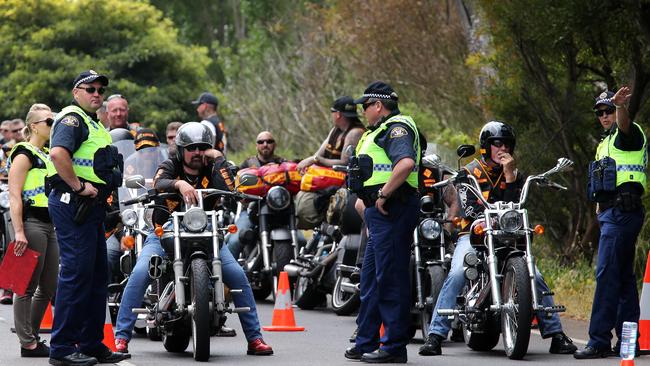Bikie laws are needed
The consorting laws to be introduced to Parliament tomorrow by Police Minister Michael Ferguson as part of his war on outlaw motorcycle gangs strike what appears to be the right balance.

Opinion
Don't miss out on the headlines from Opinion. Followed categories will be added to My News.
AT first blush, the idea of legislating to ban people who are not in jail from spending time with others who are also not locked up sounds pretty extreme. But the consorting laws to be introduced to Parliament tomorrow by Police Minister Michael Ferguson as part of his war on outlaw motorcycle gangs strike what appears to be the right balance.
The Bill effectively introduces a three-strikes-and-you’re-out approach to the banning of previously convicted criminals from spending time with other previously convicted criminals. As Minister Ferguson explained yesterday, the intent is to impose a strong deterrent to the establishment, maintenance and expansion of criminal networks.
Any analysis of such laws must start with who might be exposed to this new ban. And the legislation in this regard is very clear: it would only apply to criminals who have previously been convicted of a “serious offence” — that is, any indictable offence or breach of laws relating to firearms, drugs and the sex industry, and those that ban the production or distribution of child pornography. These are not your common low-level car thieves or graffiti artists. (Interestingly, the consorting laws that have been on the books in Tassie since 1935 are far less clear. They simply make it an offence for “a person” with “insufficient lawful means of support” to “habitually consort with reputed thieves” without “good and sufficient reasons”. That vague law would be repealed alongside the proposed changes.)
Minister Ferguson’s plan is to make it an offence for such convicted criminals aged over 18 to “habitually consort” with other convicted criminals. It would work like this: first, a police officer of the rank of Inspector or higher must authorise the issuing of a warning notice to a convicted criminal. Any warning notice could be appealed to the Commissioner of Police, and then to the Administrative Appeals Division of the Magistrates Court. If upheld, the convicted criminal to whom the notice applies would then still have two more strikes: the legislation clearly spells out that the definition of “habitual” is that the consorting must have occurred on at least two occasions within a five-year period.
So there’s a preliminary warning system, a judicial review process — and then a second chance.
Importantly, the ban would also not apply to “reasonable consorting” between parents, grandparents, spouses, siblings and dependants. Further defences would exist for consorting for the purposes of educational, health, legal, business or employment purposes.
Similar laws now exist in every other state, and in the Northern Territory. That leaves Tasmania exposed — and therefore an attractive place for outlaw motorcycle gangs to set up their operations.
As we have said in this column on many occasions, these laws are necessary — just as the legislation that was passed recently by State Parliament banning the wearing of club insignia in public was. These new powers were asked for by the police, the men and women we trust to bravely maintain law and order. It is the Parliament’s duty to now properly test the Bill to ensure the right protections are in place and that any loopholes have been closed — and then to make it law.


